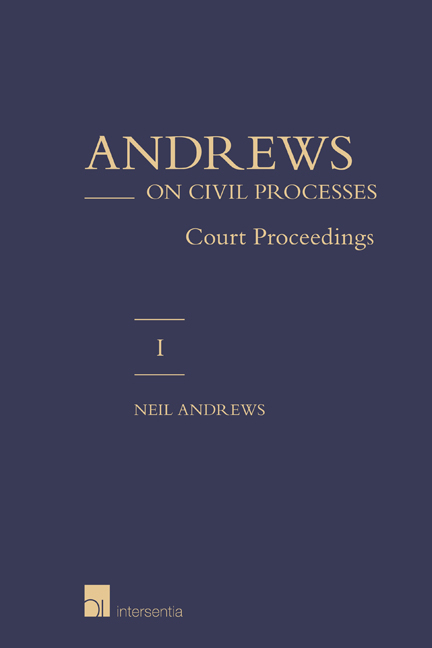Book contents
- Frontmatter
- Dedication
- Epigraph
- Preface
- Contents
- Table of Cases
- Table of Statutes
- Table of Statutory Instruments
- PART I INTRODUCTION TO THE FORMS OF CIVIL JUSTICE
- PART II COMMENCEMENT OF COURT PROCEEDINGS AND PREPARATION FOR TRIAL
- PART III END-GAME: TRIAL, APPEAL, FINALITY AND ENFORCEMENT
- PART IV COSTS AND FINANCING OF LITIGATION
- Chapter 18 Basic Costs Principles
- Chapter 19 Security for Costs
- Chapter 20 ‘No Win, No Fee’ Systems
- PART V SPECIAL PROCEEDINGS
- PART VI PRINCIPLES OF CIVIL LITIGATION
- PART VII THE EUROPEAN CONTEXT
- Select Bibliography
- Index to Volumes I and II
Chapter 18 - Basic Costs Principles
from PART IV - COSTS AND FINANCING OF LITIGATION
Published online by Cambridge University Press: 13 December 2017
- Frontmatter
- Dedication
- Epigraph
- Preface
- Contents
- Table of Cases
- Table of Statutes
- Table of Statutory Instruments
- PART I INTRODUCTION TO THE FORMS OF CIVIL JUSTICE
- PART II COMMENCEMENT OF COURT PROCEEDINGS AND PREPARATION FOR TRIAL
- PART III END-GAME: TRIAL, APPEAL, FINALITY AND ENFORCEMENT
- PART IV COSTS AND FINANCING OF LITIGATION
- Chapter 18 Basic Costs Principles
- Chapter 19 Security for Costs
- Chapter 20 ‘No Win, No Fee’ Systems
- PART V SPECIAL PROCEEDINGS
- PART VI PRINCIPLES OF CIVIL LITIGATION
- PART VII THE EUROPEAN CONTEXT
- Select Bibliography
- Index to Volumes I and II
Summary
A TIME OF CHANGE
Lord Justice Jackson's ‘Civil Litigation Costs Review’ (2009–10) placed the whole topic of costs and funding under scrutiny. The ‘Woolf reforms’ were expected to alleviate the problem of the high cost of civil litigation. But the situation has not improved. The topic of costs has become highly technical. English civil justice is perhaps unusual in providing specialist judges, known as ‘costs judges’, to decide certain costs matters. Furthermore, as noted by Lord Neuberger MR, a Costs Council is proposed to monitor the complicated system of costs in general.
LAMENTATIONS
In a lecture (2012) Lord Neuberger MR concluded:
‘Over the last ten years, civil litigation costs have continued to increase. In that respect the Woolf reforms, one of the main aims of which was to provide a cure for excessive litigation cost, failed. Indeed, I regret to say that the Woolf reforms are generally thought to have increased litigation costs. Certainly, the reforms… have front-ended costs, which is particularly unfortunate given that the great majority of cases settle before they get to trial.’
Lord Neuberger MR also quoted the distinguished practitioner, Geoffrey Bindman, whose pre-CPR remarks remain relevant:
‘The secret, perhaps half-perceived at the time, was the open-endedness of litigation. The more work one did, the more one got paid: and there was no limit to the amount of work one could do, and even justify it. Barristers were encouraged (if they needed encouragement) to join in the fun. More recently the tail started to wag the dog. The litigation machines in the large firms had to be fuelled. Every case had to be expanded to fi ll the resources available to work on it. The pattern set by the larger firms had to be followed by everyone else. However many letters came from one side, the other had to reply… just as one barrister cannot afford to leave unanswered a point taken by his opponent. However much money one side chose to invest in the case, the other had to match it or go to the wall.’
Information
- Type
- Chapter
- Information
- Andrews on Civil ProcessesCourt Proceedings, pp. 519 - 550Publisher: IntersentiaPrint publication year: 2013
